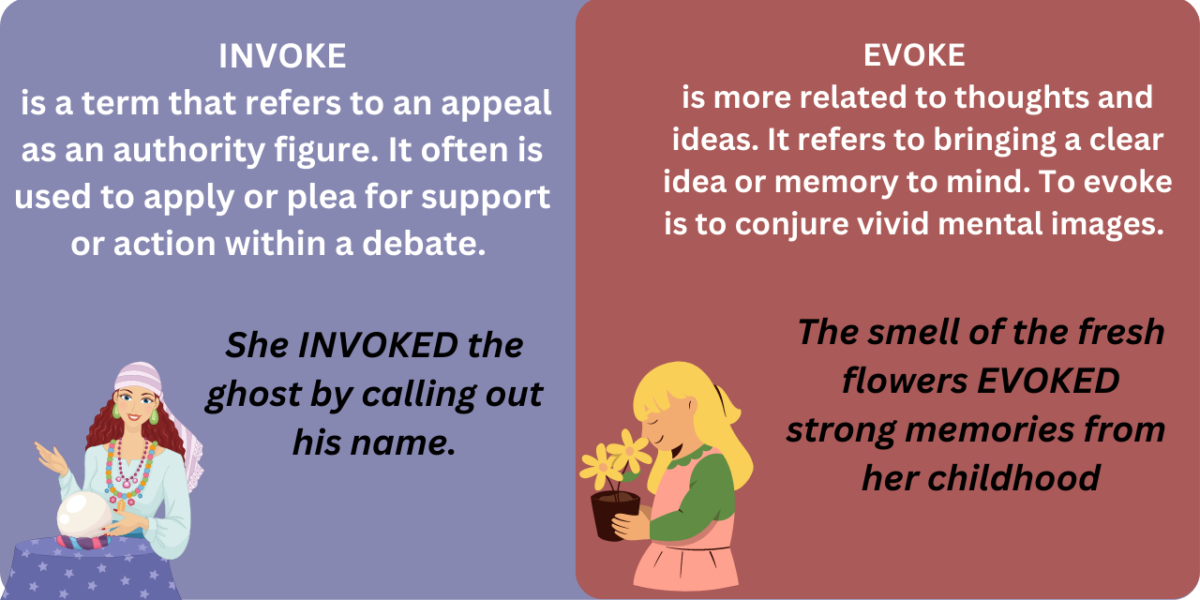Although these two words may not be true homophones, they sound similar. This similarity can often confuse people trying to use them in writing or speech. Thus, what do invoke and evoke mean? And what’s the best way to use them in your writing? Let’s tackle invoke vs evoke!
What Do Invoke and Evoke Mean?
A lot of the challenge with these words comes with the fact that they are pronounced and spelled the same. In addition, they also have some overlap in their definition, which can add another layer of complexity. Regardless, there is a slight difference between them which is important.
- Invoke is a term that refers to an appeal as an authority figure. It often is used to apply or plea for support or action within a debate.
- Evoke is more related to thoughts and ideas. It refers to bringing a clear idea or memory to mind. To evoke is to conjure vivid mental images.

Origin of Invoke vs. Evoke
In their basic origin, both words come from the Latin word vocare, meaning “to call.” Specifically, you may have seen words with the root –voke. This root generally means “to call.” Within Latin, vocare was adapted to give us the roots for invoke and evoke.
- Invoke comes from the Latin root invocare, meaning “to call upon.”
- Evoke comes from the Latin root evocare, meaning “to call forth.”
How to Use Invoke and Evoke
Now that you know what these words mean and how they originated in the first place, we can discuss how you can use them in your writing. Although they are similar, take note of the small nuances between them to help you distinguish their usage.
Using Evoke
Evoke acts as a verb when used in common English. Specifically, it references emotions, reactions, thoughts, ideas, or feelings. For instance, something that is evocative would make someone feel strong feelings or memories.
Using Invoke
Again, in its basic form, invoke acts as a verb that generally means “to call upon.” In most contexts, this happens to be concerning spirituality and religion.
In another sense, however, it can also be used to show when you are appealing for authority or action within an argument.
Similar Words for Invoke and Evoke
You may have also seen verbs or adverbs that act similarly to invoke and evoke. Although we won’t detail those, it may help you see a compiled list. Some of these most common include:
- Summoning
- Conjuring
- Revoke
- Incantation
Trick For Remembering the Differences
These two words are hard to differentiate. This is especially true because their meanings can overlap in many instances. Luckily, this quick memory trick can help you remember what evoke means compared to invoke.
- Think of the “E” in evoke for “emotions.” Remembering that evoking something elicits an emotion or feeling may help you remember the difference between the two.
Examples of Invoke
Take a look at these sentence examples that use the word invoke. Although they have similar meanings, try to look at the nuanced meaning of this word.
- He invoked the spirits while using the ouija board.
- She invoked the name of God during the exorcism.
- Damien Invoked the fifth amendment in court.
- Many people feel comforted when they invoke a higher power.
Examples of Evoke
Now, look at these example sentences that use the word evoke.
- The movie evoked sad feelings within me.
- I couldn’t help but smile during the show. It was incredibly evocative.
- Sarah is an evocative speaker.
- The song evoked a feeling of loneliness.
- I had no idea that your testimony would evoke so many childhood memories.






